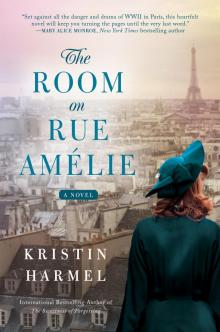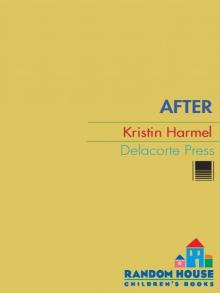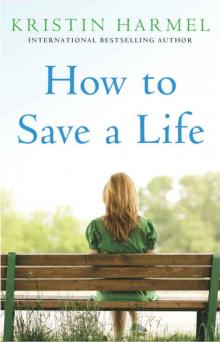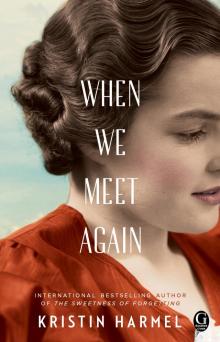- Home
- Kristin Harmel
The Winemaker's Wife Page 21
The Winemaker's Wife Read online
Page 21
“Was that Julien?” Grandma Edith asked as Liv walked up beside her.
“Yes. He’s going to come do the tour with us.”
“Yes, of course he is.”
“Are you okay?”
Grandma Edith didn’t answer. In the distance, a flock of black birds took flight from beyond the slope of the hill, and Liv watched them go. It wasn’t until she lost sight of them that Grandma Edith finally spoke. “Do you ever think that the ghosts of the past are still with us? And that perhaps they’ve been here all along, to remind us of all we have lost?”
Liv followed the older woman’s eyes back out to the long rows of vines, and for a moment, she thought of her own father, whom she’d barely had a chance to know. She’d been just a baby when he died, but sometimes, especially in times of darkness or doubt, she felt a presence with her, and she wondered if it was him. She could almost believe it, for how could a parent ever fully leave a child without knowing whether he or she would be all right?
As a car made its way down the narrow lane in the distance, heading toward the main house, Liv watched as a large white bird lifted off, startled by the passing vehicle, and she thought of Delphine, Julien’s wife, who’d never known her daughter at all. Perhaps she was still here, too, watching over all of them.
Liv felt tears in her eyes. “Yes, I believe that very much.”
“I wonder sometimes why I am the one still alive after all this time,” Grandma Edith said, her voice a whisper. “I was never supposed to be here at all.”
“Well, I’m glad you are,” Liv said. “You’ve been the one constant in my life all these years.”
Liv slipped an arm around her grandmother, who didn’t resist, and the two of them stood there for a long time, each of them communing with their own ghosts as they gazed out over the vines toward an infinite horizon.
twenty-four
JANUARY 1943
INÈS
Perhaps she could be redeemed after all.
That was what Inès was thinking when Michel came home late on the morning of the Cohns’ arrival at the Maison Chauveau, his Citroën bumping over the frozen drive. Céline was inside her own cottage with Theo, having begged him to repair their broken stove as a distraction, leaving Inès to give Michel the news about their new guests.
“You are telling me that in the hours I have been gone, you have agreed to harbor two refugees?” he asked when she was done telling him the story of the Cohns’ escape from Reims.
“Please don’t be angry. It was no longer safe for them above the brasserie, and—”
“I’m not angry, Inès,” Michel interrupted. “I’m just surprised. I had no idea you were involved with such things.” He was looking at her like perhaps he’d never really known her at all.
“Well, yes,” she said, turning away. She didn’t want to tell him that she’d merely stumbled upon the Cohns, and that in fact she had come very close to being on the other end of this fight. But she was on the correct side now, and surely that was what mattered. “I just want to do what is right,” she said demurely.
“Well.” Michel seemed at a temporary loss for words. “I’ll go meet them now. Would you prepare them something to eat? They must be hungry after their travels.”
“I’ve already packed them a lunch,” Inès said, picking up the small bundle of cheese and bread she’d put together while she waited for Michel’s return.
“Does Céline know?” Michel asked suddenly.
Inès hesitated. “Yes. She was here when Edith and I arrived with the Cohns. I needed her help.”
“And Theo?”
“No. Céline was not sure whether to trust him.”
“Good.” As they walked outside to the main entrance to the cellars, Michel added, “Where exactly are they?”
“In the secret room. The one Céline knew about, but I did not.” She couldn’t keep the sting out of her voice. “You were keeping it from me?”
Michel sighed as they reached the bottom of the winding steps. “I’m sorry, Inès.”
But what was he sorry for, exactly? For shutting her out of her own life, her own marriage? “I would have kept your secret, you know.”
He hesitated. “I know.” But he didn’t look at her again as she followed him wordlessly deeper into the twisting darkness, their way lit only by the lamp he carried.
They found the Cohns hunched where Inès had left them, partially hidden behind barrels. “Samuel? Rachel?” Inès called out. “It is Inès. I have brought my husband, Michel.”
Slowly, the Cohn siblings emerged, Rachel looking worried, and Samuel sheepish. “Désolé,” Samuel said, coming forward to greet Michel and Inès. “We heard footsteps, and we weren’t sure what to do.”
“You did the right thing,” Michel assured them. “Welcome to the Maison Chauveau.”
“I’m very sorry for the inconvenience,” Samuel said.
“Nonsense.” Michel’s smile was tense but genuine. “It is the two of you who are owed the apology, for the way France has treated you. We will try to keep you safe until our country comes to its senses. It seems the world has gone mad, does it not?”
“Indeed.”
“Now, I must ask something of you.”
“Yes, anything,” Samuel said instantly.
“My head winemaker, Theo Laurent, is a good man, but he knows nothing of the activities I carry on here. It would be better if he does not know of you and your sister. I feel that we could trust him if it came down to it, but I do not want to put him in the position of having to weigh the laws against his conscience.”
“We understand,” Samuel said, glancing at Rachel, who nodded. “We will stay out of sight.”
“Good,” Michel said. “And we will make every effort to move you as soon as possible. We’ll just need some time to obtain false papers.”
“Yes, of course,” Samuel said. “And I promise, we will repay you and your family one day, just as soon as we are able.”
“There is no need,” Michel said.
“But we must.”
The two men shared a moment of silent understanding. “Well,” Michel said, glancing at Inès once more. “I should begin making arrangements. Inès, would you like to stay and make sure the Cohns are comfortable?”
“Of course.”
“I’ll leave you to it, then.” Michel gave her a perfunctory kiss on the cheek before nodding to the Cohns and leaving the cave.
“Here, I have brought you some food. I don’t know when you last ate,” Inès said once Michel’s footfalls had faded. From the way they ravenously attacked the small spread she placed on the stone bench, she guessed that it had been a long while. “Is there anything else you need?” she asked as Samuel and Rachel polished off the last of the minuscule meal. “We don’t have much, but—”
“No, no, we are grateful for every kindness.” Samuel hesitated. “I meant what I said to your husband. We will owe you after this, all of you, Madame Thierry and Madame Laurent, too.”
“You owe us nothing.”
“But you are risking your lives to save ours. Before I was barred from university, I was studying the law. And when the war is over, I will finish my final exams and become a lawyer. I very much hope that I am one day in a position to help you, and to make sure that the law is always on the side of those who are virtuous.”
“I’m not so sure that’s what I am.” The words were out of Inès’s mouth before she could consider them. “I’ve done things I regret very much.”
“Whatever has happened, I will tell you this: a person who has lost her way would never risk her life to help people in need. You’re a good person, madame.”
Inès pressed her lips together. If he realized what she’d been doing behind her husband’s back, he would feel differently. “May I ask you something?”
“Of course.”
“Why were the Germans after you?”
“Why indeed,” he muttered. “Well, I suppose it’s because we were born in Polan
d. My whole family came here when Rachel and I were just small children, so France is the only home we have ever known. We are as French as you are, I think. But to the Germans, it doesn’t matter. Rachel and I were on our way home from visiting a friend in October when we saw the vehicles in front of our house. We hid and watched them take our parents away. I did nothing to stop it, and that is something I will have to live with forever.”
“But surely you’ll be reunited after the war. They’re only sending Jews to work camps.”
“Is that really what you believe?” Samuel’s tone wasn’t unkind. “Madame Chauveau, the camps are a facade. Most people—especially those the Germans don’t deem fit for labor—are disappearing upon arrival.”
“But that can’t be true. The French police wouldn’t be complicit in something like that.”
Samuel sighed. “I think many of them might not have understood at first what they were involved in, just as many French civilians do not understand it now.”
Inès just looked at him.
“The police know now, though. I believe they do, anyhow. Did you know that during the roundups in Reims in July, there was a French policeman who killed himself instead of making an arrest?” Samuel asked after a moment.
“What?”
“I saw it with my own eyes. He was dragging a child out from her home, a little girl who couldn’t have been more than five or six. He turned to his commander and cried out, ‘You know where they’re going! How can we send a child to that fate?’ His commander replied in a low voice, something I didn’t hear, and gestured angrily to the truck where the girl’s family waited. The French officer bent and whispered something to the girl—I imagine he told her to run, because she did—and then he took his pistol to his own head and fired without a second of hesitation.”
“He shot himself in the head? Just like that?” Inès felt suddenly cold all over.
“I think he could not live with himself. Or maybe he just knew that taking his own life would give the girl a chance to get away in the chaos.”
“And did she?”
Samuel smiled slightly. “Last I heard, she was living safely with a family in the countryside. And as for the French policeman, well, maybe now he has found some peace. Perhaps in dying to give someone else the life that was always meant to be hers, he was redeemed.”
• • •
It took three days for Michel to connect with someone capable of moving the Cohns along an established escape line. Inès held her breath, as did Michel and Céline, each day as Theo descended into the cellars. Of course Inès had walked the underground halls thousands of times without noticing the hidden room, but what if Samuel or Rachel coughed or knocked against something with Theo in earshot?
On the fourth day, Inès was surprised to see a dark car she didn’t recognize pull down their drive just after dusk. “It is time,” Michel said, and after he and Inès moved the armoire in the kitchen, he made his way down to the caves without another word. In Céline and Theo’s cottage, Inès could see a light on, the shadows of Céline and Theo at the table, and she prayed that Céline would keep her husband’s attention away from the windows.
Michel emerged ten minutes later with Samuel and Rachel, both of whom exchanged kisses with Inès.
“We will not forget the kindness you have shown,” Samuel said as Michel hurried them toward the door. “May God keep you safe.”
“And you,” Inès replied, feeling a strange sense of emptiness as soon as they were gone. By the time Michel came back into the house, she was crying.
“You hardly knew them,” Michel said, eyeing her warily and then glancing out the window toward the Laurents’ cottage, where Theo’s shadow was still visible at the table.
“But I feel responsible, Michel. I couldn’t live with myself if they didn’t make it safely to freedom.”
“All we can do is perform our own duties as effectively as possible and hope that luck is with us. Come, help me move the armoire back in place.”
“So have you hidden people here before?” Inès asked carefully as she wiped her eyes and crossed the room to help Michel push the large piece of furniture back over the cellar’s entrance. “Helped them escape? Has this been going on beneath my feet all along?”
Michel seemed to be considering his words as he stepped back. “Inès, I want very much to keep you out of this, for your own safety.”
“I think it’s too late for that, don’t you? You owe me the truth.”
Michel just looked at her, and in his gaze, she saw suspicion, uncertainty.
“You owe me trust,” she said quietly, her tears coming again, and finally, he moved toward her and wrapped her in his arms. She couldn’t remember the last time he had held her this way, like she was something of value, something that deserved protection, and it only made her cry harder.
“Shhhh,” he murmured, stroking her back until her tears ceased.
“Michel?” For a moment, she was sure he would kiss her, but instead, he cleared his throat and stepped back. Out of his arms, she felt suddenly unmoored.
“To answer your question,” he said, “no. The Cohns are the first people I have concealed.”
“But yet you knew exactly where to send them when Edith and Edouard couldn’t find them a way out.”
He gazed at her for a long time. “There is a network that moves secrets across the Swiss border.”
“Secrets?”
“Information. From within our country.”
“What kind of information?”
“Documents. Microfilms, sometimes. Whispers that help the Allies understand what is coming next. It’s run by some Dutch people who have formed a community here in France.”
Inès felt a shiver run down her spine. “And you are part of all this?”
He glanced at her. “This network doesn’t go through Champagne. But from time to time, there are people here who have contact with the line. And I know that recently they’ve been moving refugees.”
“But how?”
“There are false documents. Cover stories. Handshakes with authorities who are secretly on our side. It is all very dangerous, Inès, and that is why I don’t want you involved.”
But she was already involved, and they both knew it. “Where will the Cohns go from here?”
“Paris. And then, I believe, south to Lyon, and then Annecy, near the Swiss border.”
Inès stared at her hands for a long time in silence. They were hands that had betrayed her husband, but they were also hands that were capable of saving lives, and there was power in that. She reached across the divide and touched Michel lightly on the arm. He jumped as if she’d burned him, and she withdrew. “I want to help more people.”
“It is not possible.”
“Anything is possible.”
Michel shook his head. “Theo has no idea what we’re doing, and to do this again, right under his nose, would be to flirt with disaster.”
“Then tell him.”
Michel blinked. “I cannot.”
“Why? Céline knows, doesn’t she? I’m sure he would do anything to protect her, with a child on the way. He would not put the mother of his child in danger by betraying any of us.”
Michel looked away. “You must understand, Theo is much more rigid in the way he thinks about right and wrong. It is what makes him a good winemaker, but perhaps not a great contributor to our cause.”
“I thought he was your friend.”
Michel frowned. “He was. But we think of things differently now. And though I believe he would do anything to protect Céline, I’m not so sure he has the same allegiance to you or me.”
twenty-five
MARCH 1943
CÉLINE
After they’d gotten word in February that the Cohns had made it safely to Switzerland, Céline had suggested to Michel that they should volunteer to hide more refugees, since they had the perfect spot to do such a thing. But he had vehemently disagreed, telling her it would put her—and the
baby—in too much danger. “It is perilous enough that we are still working to move arms across the region,” he said without meeting her eye. “To do more than that, Céline, would be far too dangerous.”
By March, though, the demand for safe houses was greater than ever, and the cold German officer, Hauptmann Richter, hadn’t reappeared with any more threats, so Céline begged Michel to reconsider. “We have the means—and the location—to help people,” she said. “Michel, we are very careful. We must do this.”
Earlier that morning, Theo had said he needed to go into Reims for some supplies, and Inès had asked if she could go along in order to see Edith. It was the first time Céline and Michel had been alone in more than a month, and now they were lying side by side in the hidden room after making love on a pile of threadbare blankets. Michel’s hand rested gently on Céline’s growing belly.
“My love, think of the risk,” Michel murmured, tracing circles around her navel. She felt the baby stir.
“The risk in not helping is far greater,” Céline replied, her eyes half closed as she moved to lay her head on Michel’s chest. He laced his fingers gently through her hair, stroking her head so tenderly that she thought she might fall asleep. “It is very possible that I myself will need to avail myself of an escape line. And don’t forget that this child will have Jewish blood, too. Who knows how far the Germans will go? Better that we become part of the way out, so we can escape if need be.”
Michel didn’t say anything right away, but his hands traveled with more agitation across the crown of her head, his fingers tangling in her waves. “A way out won’t do us any good if we are already dead,” he said.
“Then we will do our best to stay alive.”
“And you think we can trust Inès?”
Michel’s mention of his wife jolted Céline out of her dreamlike reverie, and she sat up abruptly. “Look at us, Michel, sneaking into the caves as soon as our spouses disappear. She is more trustworthy than we are.”
Michel sat, too, then rose to his feet. He offered a hand to Céline. Her arms and legs were swollen, the weight of her belly making her unsteady. “I suppose you are right,” Michel said. “But if she finds out about us now . . .”

 The Room on Rue Amélie
The Room on Rue Amélie The Winemaker's Wife
The Winemaker's Wife The Forest of Vanishing Stars
The Forest of Vanishing Stars The Book of Lost Names
The Book of Lost Names Italian for Beginners
Italian for Beginners After
After How to Save a Life
How to Save a Life The Blonde Theory
The Blonde Theory The Sweetness of Forgetting
The Sweetness of Forgetting When We Meet Again
When We Meet Again Life Intended (9781476754178)
Life Intended (9781476754178)